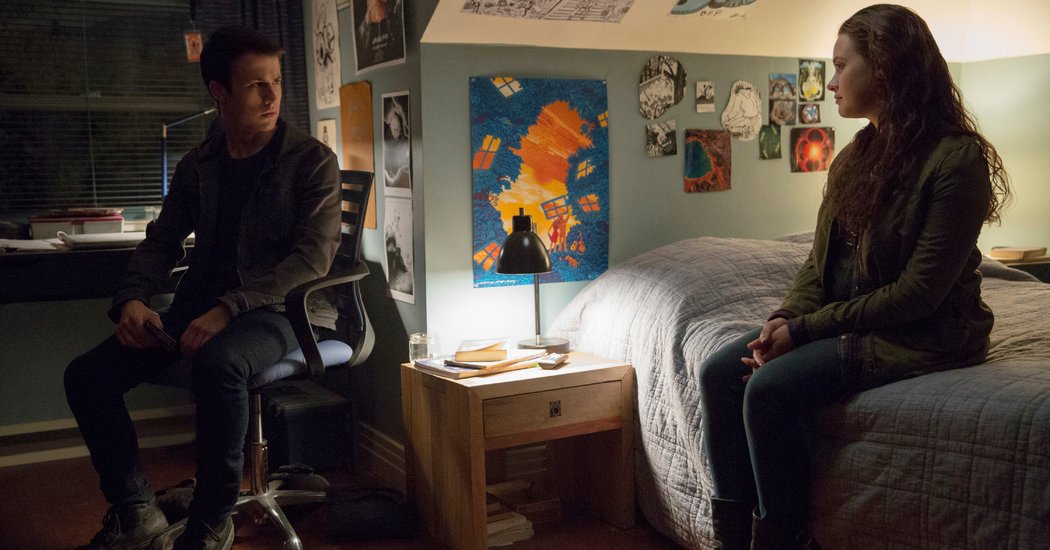Netflix has deleted a graphic scene from the first season of “13 Reasons Why” in which a teenage girl kills herself, more than two years after the episode premiered.
“We’ve been mindful about the ongoing debate around the show,” Netflix said in a statement posted on Twitter on Tuesday. Netflix said the decision had been made “on the advice of medical experts,” including Dr. Christine Moutier, the chief medical officer at the American Foundation for Suicide Prevention.
“No one scene is more important than the life of the show, and its message that we must take better care of each other,” Brian Yorkey, the show’s creator, said in a separate statement on Twitter on Tuesday.
“We believe this edit will help the show do the most good for the most people while mitigating any risk for especially vulnerable young viewers,” he added.
The first season of “13 Reasons Why” appeared in March 2017. The plot is set in motion when a teenage girl, Hannah Baker, kills herself. Before her suicide, she makes 13 cassette recordings detailing the agonies of her life, both to explain her actions and to accuse those she holds responsible, including a man who raped her, bullies and fickle friends.
The show was a hit, but it also gave rise to a chorus of complaints from educators and mental health experts who said the show’s portrayal of suicide was potentially dangerous, and risked inspiring copycat behavior among vulnerable teens.
The suicide scene, in the final episode of the first season, originally showed Hannah graphically cutting her wrists in a bathtub. Now it shows her staring at herself in the bathroom mirror, and seconds later, her parents entering the bathroom and discovering her body.
In May 2017, Netflix said it would add an extra warning at the start of the series, on top of warnings appearing before the episodes that depicted rape and Hannah’s suicide. “While many of our members find the show to be a valuable driver for starting important conversation with their families, we have also heard concern from those who feel the series should carry additional advisories,” Netflix said in a statement at the time.
The issue returned in April, when a study published in the Journal of the American Academy of Child and Adolescent Psychiatry found that suicide rates spiked among boys aged 10 to 17 in the month after the release of the first season. That month, April 2017, had the highest overall suicide rate for boys in that age group for the past five years, the study found.
“It was our hope, in making ‘13 Reasons Why’ into a television show, to tell a story that would help young viewers feel seen and heard, and encourage empathy in all who viewed it,” Yorkey said in his statement on Tuesday. The show portrayed suicide “in such graphic detail” to show the horror of the act and to “make sure no one would ever wish to emulate it,” he added.
Dan Reidenberg, the executive director of SAVE, a suicide prevention organization, said in a telephone interview that he was glad Netflix had made the change. “However, that doesn’t change the entire first season that had many problematic messages in it,” he added.
He said those problems included presenting suicide as a way to get revenge and giving the impression that people experiencing suicidal thoughts could not get help.
Reidenberg said he had been a consultant for the first season of “13 Reasons Why” after it finished production, but before it was broadcast. “It would have been better if these issues were addressed prior to it being made,” he added.
Colleen Creighton, the executive director of the American Association of Suicidology, said in a telephone interview that Netflix had taken a while in acting, but the program makers should be praised for deleting the scene.
After season one was broadcast, Netflix formed an advisory team of people working in suicide prevention to discuss the program, she said. “A lot of the issues with series one they fixed for series two, and they’ve talked to us about season three as well,” she added.
Yorkey said in his statement that the third season of “13 Reasons Why” would be released soon.


Alex Marshall is a European culture reporter, based in London. @alexmarshall81
Source: Read Full Article
